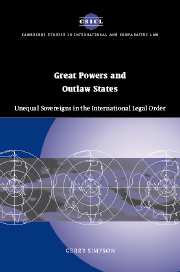Book contents
- Frontmatter
- Contents
- Foreword
- Preface
- Acknowledgements
- List of abbreviations
- Part I Introduction
- Part II Concepts
- Part III Histories: Great Powers
- 4 Legalised hegemony: from Congress to Conference 1815–1906
- 5 ‘Extreme equality’: Rupture at the Second Hague Peace Conference 1907
- 6 The Great Powers, sovereign equality and the making of the United Nations Charter: San Francisco 1945
- 7 Holy Alliances: Verona 1822 and Kosovo 1999
- Part IV Histories: Outlaw States
- Part V Conclusion
- Select bibliography
- Index
5 - ‘Extreme equality’: Rupture at the Second Hague Peace Conference 1907
Published online by Cambridge University Press: 05 July 2009
- Frontmatter
- Contents
- Foreword
- Preface
- Acknowledgements
- List of abbreviations
- Part I Introduction
- Part II Concepts
- Part III Histories: Great Powers
- 4 Legalised hegemony: from Congress to Conference 1815–1906
- 5 ‘Extreme equality’: Rupture at the Second Hague Peace Conference 1907
- 6 The Great Powers, sovereign equality and the making of the United Nations Charter: San Francisco 1945
- 7 Holy Alliances: Verona 1822 and Kosovo 1999
- Part IV Histories: Outlaw States
- Part V Conclusion
- Select bibliography
- Index
Summary
Even among the angels, inequality is indispensable to order.
Introduction
Many of international law's great romantic projects originated at The Hague Peace Conferences. Students of the laws of war remember them as the moments when the idea of humanising armed conflict was secured in convention form. International organisations scholars look back fondly at the blueprints for international order sketched at The Hague. Procedurally, the conferences in 1899 and 1907 ushered in the expectation that congresses of states would be inclusive and universal. International arbitration, too, was formalised here following the success of various ad hoc schemes in the eighteenth and nineteenth centuries. This chapter, though, is about, predominantly, The Hague Conferences' greatest failure: the project to create an international court of justice. In particular, I explore the role of two diplomats (a North American and a South American) whose views of international order clashed resulting in the decision to abandon, temporarily, the pursuit of international court-based justice. James Brown Scott was the United States delegate at The Hague Conference in 1907. He was also one of the most eminent American international lawyers of his generation: a president of the American International Law Institute, the solicitor-general of the United States Department of State and an editor of the American Journal of International Law. Scott wanted to build an international legal order that was effective and enforceable. To this end he argued for a judicial institution in which Great Powers were given special representation.
- Type
- Chapter
- Information
- Great Powers and Outlaw StatesUnequal Sovereigns in the International Legal Order, pp. 132 - 164Publisher: Cambridge University PressPrint publication year: 2004



